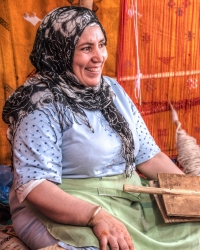Berber, Tamazight in Algeria

Photo Source:
Marco Vangelisti
Creative Commons
|
Send Joshua Project a map of this people group.
|
| People Name: | Berber, Tamazight |
| Country: | Algeria |
| 10/40 Window: | Yes |
| Population: | 1,781,000 |
| World Population: | 4,897,000 |
| Primary Language: | Tamazight, Central Atlas |
| Primary Religion: | Islam |
| Christian Adherents: | 0.10 % |
| Evangelicals: | 0.09 % |
| Scripture: | Portions |
| Ministry Resources: | Yes |
| Jesus Film: | Yes |
| Audio Recordings: | Yes |
| People Cluster: | Berber-Shilha |
| Affinity Bloc: | Arab World |
| Progress Level: |
|
Introduction
People called Berbers are divided by subgroups based on language or region. The term Berber, placed on them during the Roman Empire, means “barbarians.” They prefer the term Imazighen meaning “free men” for they value freedom and independence. However, the term Berber is so well-engrained that people seldom know who they are without using this derogatory term. Berbers live primarily in the beautiful, wooded High Atlas and Middle Atlas Mountains of Central Morocco. All of the Berbers speak Tamazight; however, many also speak Arabic, Algeria's official language.
Ministry Obstacles
Only about one in a thousand bow the knee to Jesus Christ. With so few believers, Berbers need outsiders to bring the gospel.
Outreach Ideas
Pray for the Followers of Christ
Pray for the Entire People Group
Pray for a spiritual hunger among Berbers that will lead them to the cross and the empty grave.
Pray for Berbers in Algeria to put their faith and hope in Christ, paving the way for Berber disciples to make more disciples.
Pray for loving workers to go to leaders and find persons of peace who will welcome them into their communities with the gospel.